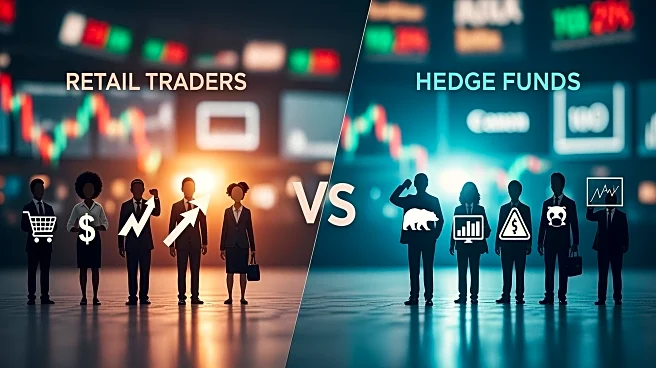What's Happening?
Retail investors have significantly increased their stock purchases during last week's market sell-off, according to Bank of America Securities. The bank reported $4.1 billion in inflows to single stocks
from clients, marking the fifth largest inflow since 2008. This surge in retail trading activity follows four weeks of selling and highlights the trend of retail investors buying on market dips, contributing to multiple stock highs this year. In contrast, hedge funds have been net sellers of U.S. equities for the fifth consecutive week, maintaining a conservative stance despite the market rally. Data from Goldman Sachs and JPMorgan indicate that hedge funds have been cautious, especially as the S&P 500 reached record highs earlier this month.
Why It's Important?
The contrasting strategies between retail investors and hedge funds underscore a significant shift in market dynamics. Retail investors' aggressive buying during market dips suggests increased confidence and risk tolerance, potentially driving stock prices higher. This behavior can influence market volatility and impact stock valuations. On the other hand, hedge funds' cautious approach reflects concerns about market sustainability and potential overvaluation. The divergence in strategies may affect market liquidity and investor sentiment, with retail investors potentially gaining from short-term price movements while hedge funds focus on long-term risk management.
What's Next?
The ongoing divergence between retail investors and hedge funds could lead to further market volatility. If retail investors continue to buy aggressively, stock prices may rise, potentially attracting more institutional interest. However, if hedge funds maintain their cautious stance, it could signal underlying market concerns, possibly leading to a correction. Market participants will closely monitor economic indicators and corporate earnings reports to assess future market trends. Additionally, regulatory scrutiny on retail trading platforms may increase, impacting retail investor behavior.
Beyond the Headlines
The rise of retail investors in the stock market highlights broader changes in investment culture, driven by technology and accessibility. Platforms like Robinhood have democratized trading, allowing more individuals to participate in the market. This shift raises questions about market stability and the role of traditional financial institutions. The increased influence of retail investors may lead to changes in market regulation and the development of new financial products tailored to this demographic.









